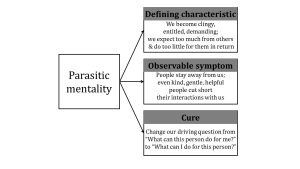 Parasites are organisms that grow at the expense of their hosts. When parasites infect our body, they suck our energy and sap our health, leaving us weak and sick. If we observe such symptoms in ourselves, we can infer that we have been infected by some parasite and promptly take the necessary treatment.
Parasites are organisms that grow at the expense of their hosts. When parasites infect our body, they suck our energy and sap our health, leaving us weak and sick. If we observe such symptoms in ourselves, we can infer that we have been infected by some parasite and promptly take the necessary treatment.
Just as our body is vulnerable to parasites, our mind is vulnerable to a parasitic mentality. Let’s understand this mentality through three points:
Defining characteristic: When we are infected by such a mentality, we become clingy, entitled, demanding: we expect too much from others and do too little for them in return. We feel that others should be doing whatever we tell them to; indeed, they should fulfill our desires even without being told. During our interactions with others, including especially our loved ones, we fixate only on one question: “What can this person do for me?” When people see that their interactions with us revolve around we taking from them — be it money or service or attention — and not giving much in return, they feel annoyed, exasperated, even disgusted. They become sick of us.
Observable symptom: If we find that many people prefer to avoid us, such behavior may well be a symptom that we are infected by a parasitic mentality. If those who seek to shorten their interactions with us include people who are usually kind, helpful and patient, then that is a glaring red sign of severe infection. The Bhagavad-gita (18.35) warns about such a toxic mentality.
Cure: To treat a parasitic mentality, we can begin by changing the driving question in our interactions — instead of letting ourselves gravitate toward our default question, “What can this person do for me?” we can consciously ask the opposite question, “What can I do for this person?” What if we feel that we can’t do anything significant for them? We can still start with small simple things: speak politely instead of sullenly; smile instead of scowl; and extend a helping hand instead of a pointing finger. Gradually, such micro-changes will power our detox and free us from the parasitic mentality.
One-sentence summary:
Parasites make us sick; a parasitic mentality makes people sick of us.
Think it over:
- How does a parasitic mentality affect our interactions?
- How can we check if we are infected by a parasitic mentality?
- How can we free ourselves from such a mentality?
***
18.35: And that determination which cannot go beyond dreaming, fearfulness, lamentation, moroseness and illusion – such unintelligent determination, O son of Prutha, is in the mode of darkness.
To know more about this verse, please click on the image


Thank you prabhu ji for this review, it came at the right moment.
It is quite often that I feel attacked by this kind of mentality by my mother`s side – this happened today – and I really don`t know if I am good enough in some field of activity. It is nicely explained so I can read the symptoms. It is possible that I use the same mentality at some point – time will tell if I can read the signs – but it is really uneasy if someone closest to you constantly criticises you and pinpoints your negative sides all the time or even exaggerates situations to gain advantage and control.
The situation you are describing is quite different – the below article is more relevant for that:
https://gitadaily.com/value-those-who-value-you-and-dont-overvalue-those-who-devalue-you/
GITA coats Bhakti on parasite mentality
Good point; bhakti doesn’t just coat a parasitic mentality, though – it also cures that mentality.
Can this be a reverse case as well? For eg, If there is someone with a parasitic mentality and you are now not sufficient enough to fulfil their desires, they just leave and stop talking to you and move ahead and cling on to others
Yes, that’s true.